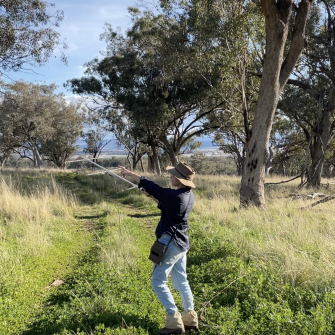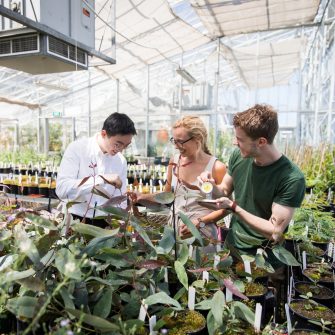Graduate Diploma in Flying
- Commencing Terms
- Term 1
- Duration
- 1.4 Year(s)
- Delivery Mode
- Face-to-face (includes blended)
- Campus
-
Kensington
- Codes
- Program code 5536
- CRICOS code -
-
2026 Indicative first year full fee
- $134,000*
-
2026 Indicative full fee to complete degree
- $165,500*
-
2026 Indicative first year full fee
- $67,000*
-
2026 Indicative full fee to complete degree
- $99,500*

- Overview
- Entry requirements
- What will I study?
- Future careers
- How to apply
- Fees & Scholarships
Overview
Take your pilot career to new heights with the Graduate Diploma in Flying at UNSW. This comprehensive 1.4-year program is designed to fast-track your journey to becoming a pilot. Dive into rigorous training and assessments, complemented by academic study in Flying Operations, to master the skies.
Gain hands-on experience and technical, interdisciplinary knowledge to become a confident and proficient pilot. The Graduate Diploma in Flying provides the necessary training and assessment for your Recreational Pilot Licence (RPL), Commercial Pilot Licence (CPL) and Instrument Rating (IR). Your training unfolds at the state-of-the-art Flight Operations Unit at Bankstown Airport where you’ll fly Diamond DA40 and Piper PA44 aircraft, equipped with cutting-edge Garmin 1000 flight display/navigation systems.
Train under the guidance of UNSW's top-tier instructors and immerse yourself in a rewarding environment that sharpens your skills, forges lifelong friendships and builds the discipline required for a thriving pilot career.
You can take the Graduate Diploma in Flying as a standalone program, or study it concurrently with the UNSW Bachelor of Aviation (Management).
Key features
Flying Operations Unit (FOU)
UNSW’s exclusive Flying Operations Unit is based at Bankstown Airport and operates a suite of aircraft, including Diamond DA40 and Piper PA44 training aeroplanes, along with state-of-the-art flight simulators and training equipment.
Pilot Mentor Program
You’ll be assigned an airline pilot as your mentor in your final year, courtesy of the Australian and International Pilots Association (AIPA). The objective of this program is to provide you with career guidance and consultation about specific airline operations.
Flight Training
Gain the necessary training and assessment for your Commercial Pilot Licence (CPL) and Instrument Rating (IR). Our ground and flying instructors are all selected, trained and employed by UNSW to ensure that our training is of the highest quality. You will commence with a Flight Screening course in September and will be expected to make yourself available on a full-time basis during flying training.
Why study at UNSW?
Leader in aviation education
UNSW School of Aviation has been a leading educator in the industry for over 25 years. Our courses are written and coordinated by experts with substantial industry experience and our aviation programs are constantly updated to keep pace with the evolving aviation industry.
Qantas Aviation Career Enrichment (Q-ACE) Program
Our second-year Bachelor of Aviation (Flying) and Graduate Diploma in Flying students now have the opportunity to participate in Q-ACE – a program delivered by the Qantas Group that helps prepare aspiring airline pilots for direct entry employment opportunities after completing their university study.
Want to see more from UNSW Science?
Entry requirements
To gain entry to this program, you must have one of the following:
- a Bachelor of Aviation (Management) at UNSW or equivalent
- a AQF level 7 bachelor's degree in a cognate discipline
- have satisfactorily completed the equivalent of 1 year FTE of the Bachelor of Aviation (Management) or Bachelor of Aviation (Flying) program at UNSW or equivalent.
You also need to meet all of the following requirements:
- have satisfactorily completed flight screening conducted at the UNSW Flying Operations Unit
- hold an Australian Class 1 Aviation Medical Certificate
- hold an Australian Aviation Security Identification Card
- be an Australian citizen or Permanent Resident
Note: A cognate discipline is one commonly used as background in managing flying operations. Cognate disciplines include engineering, physical science, mathematics, psychology or business.
English language requirements
You may be asked to provide evidence of your English proficiency to study at UNSW depending on your educational background and citizenship. English language skills are vitally important for coping with lectures, tutorials, assignments and examinations - this is why UNSW requires a minimum English language competency for enrolment.
If you’re completing an Australian Year 12 qualification (e.g. NSW HSC or equivalent), you do not need to provide anything extra to prove your proficiency. Your qualification will be used as evidence of your English proficiency.
If you do need to provide evidence of your English proficiency, this will be indicated in your application. You can prove this by providing evidence that you meet one or more of the following criteria:
- English language tests and university English courses
- Prior study in the medium of English
- Other qualifications
If you need to improve your English skills before you start your degree, UNSW College’s Academic English Programs are for you. The programs are suitable for various English levels and help you prepare for university studies and life in Australia.
For more details, visit the English Language Requirements page.
To gain entry to this program, you must have one of the following:
- a Bachelor of Aviation (Management) at UNSW or equivalent
- a AQF level 7 bachelor's degree in a cognate discipline
- have satisfactorily completed the equivalent of 1 year FTE of the Bachelor of Aviation (Management) or Bachelor of Aviation (Flying) program at UNSW or equivalent.
You also need to meet all of the following requirements:
- have satisfactorily completed flight screening conducted at the UNSW Flying Operations Unit
- hold an Australian Class 1 Aviation Medical Certificate
- hold an Australian Aviation Security Identification Card
- be an Australian citizen or Permanent Resident
Note: A cognate discipline is one commonly used as background in managing flying operations. Cognate disciplines include engineering, physical science, mathematics, psychology or business.
English language requirements
You may be asked to provide evidence of your English proficiency to study at UNSW depending on whether you are from an English-speaking background or non-English speaking background. English language skills are vitally important for coping with lectures, tutorials, assignments and examinations - this is why UNSW requires a minimum English language competency for enrolment.
If English is not your first language, you’ll need to provide proof of your English proficiency before you can be given an offer to study at UNSW. You can do this by providing evidence that you meet one or more of the following criteria:
- English language tests and university English courses
- Prior study in the medium of English
- Other qualifications
If you need to improve your English skills before you start your degree, UNSW College’s Academic English Programs are for you. The programs are suitable for various English levels and help you prepare for university studies and life in Australia.
For more details, visit the English Language Requirements page.
Check the specific English language requirements for this program
What will I study?
UNSW is introducing a new academic calendar from 2028.
We are moving to a new flex-semester calendar. What does this mean for your studies?
Program overview
The Graduate Diploma in Flying consists of four mandatory courses and a series of assessments, including flight tests and written examinations.
Program structure
This program contains a total of 48 units of credit (UOC) and can be completed in 1.4 years with full-time study. Students must complete:
4 courses – 48 UOC
Students must complete each of the following mandatory courses:
Flight tests
The following lists all of the flight tests to be passed during the program. All flight tests are conducted by a CASA Flight Training Examiner (FTE) or a CASA-Approved Testing Officer (ATO).
Recreational Pilot Licence (RPL)
Commercial Pilot Licence (CPL)
Instrument Rating - Multi Engine Aeroplane
Written examinations
The following lists all the written examinations required for licensing to be passed during the Graduate Diploma in Flying.
Pre-Solo Air Legislation
Pre-Area Solo
Recreation Pilot Licence Aeroplane (RPLA)*
Commercial Pilot Licence (CPL) (Seven Examinations)*
Instrument Rating (IREX)*
*CASA Examinations. The remainder are UNSW in-house examinations.
Additional information
For students wishing to study the Graduate Diploma in Flying concurrently with the Bachelor of Aviation (Management), please refer to the Handbook for details of the program structure.
The flying training undertaken by the Graduate Diploma in Flying is exactly the same syllabus as for the Bachelor of Aviation (Flying) program to CPL and CIR ME stages, as it is delivered under the same Operations Manual approved by CASA under CASR Part 141/142.
Future careers
Potential careers
In Australia's advanced aviation landscape, aspiring pilots often start in general aviation to build experience before exploring diverse roles such as airline, charter, or corporate pilots, flight instructors and more. This rich industry offers pathways into international flying, helicopter operations, aerial surveying, and even management positions within the aviation sector.
UNSW School of Aviation has been a leading educator in the industry for over 25 years. We’re the highest-ranked global university with a stand-alone aviation school that offers aviation degrees, operates flight training under its own Air Operator’s Certificate and undertakes research. UNSW is also recognised for producing Australia’s most employable graduates seven years in a row (Australian Financial Review (AFR) Top100 Future Leaders Awards, 2020–2026) meaning you’ll be in good stead to launch the aviation career of your dreams.
Jobs in aviation, flying and airlines
Commercial airline pilot
Private airline pilot
Technical support officer
Flight operations manager
Chief Operating Officer
Flying Instructor
Cabin Crew Manager
Fleet Planner
Flight Crew Scheduler
Airfreight Manager
Airport Planner
Aviation Safety Manager
How to apply
For applicants that do not have an undergraduate degree:
If you don’t currently hold a bachelor’s degree in a related field, you’ll need to start with the Bachelor of Aviation (Management).
- Apply for the Bachelor of Aviation (Management) through Apply section of the UAC website.
- During your first year of this degree, you can apply internally for the Graduate Diploma in Flying.
- As part of this process, you must apply for and complete the UNSW Aviation Aptitude Admissions Test to be considered for Flight Screening.
- If you successfully pass the Flight Screening, you can then apply for admission into the Graduate Diploma in Flying.
If admitted, you will study the Bachelor of Aviation (Management) and the Graduate Diploma in Flying at the same time. The combined duration of both programs is 4 years.
For applicants that have an undergraduate degree in a related field:
If you already hold a bachelor’s degree in a related discipline (such as engineering, physical science, mathematics, psychology, or business), you can apply directly for the flying pathway.
- Submit this form for the UNSW Aviation Aptitude Admissions Test by 30 June 2026.
- If shortlisted, you will be considered for Flight Screening in September of the same year.
- If you successfully pass the Flight Screening, you can then apply for admission to the Graduate Diploma in Flying for Term 1 of the following year.
Completing the Aptitude Admissions Test:
- Submit your form: To access the Aptitude Admissions Test, you must first submit the online form. Your application will be reviewed by the School of Aviation. If you’re eligible, you’ll receive instructions on how to pay for the test. The test fee is $55 (non‑refundable).
- Prepare with practice tests (highly recommended): You’re strongly encouraged to practise before sitting the Aptitude Admissions Test. Free SHL practice tests are available online. The General Ability Test and Behaviour‑Based Assessment are highly recommended, and you can complete these practice tests at any time — even before you apply.
- Access and complete the test: After your payment is received, you’ll be emailed instructions on how to access the online Aptitude Admissions Test. You must complete the test within two weeks of receiving access.
- Receive your results: The School of Aviation will let you know your test results within approximately two weeks of completing the test.
Ready to start your application?
Applicants must first complete the internal application form for the Graduate Diploma in Flying. You need to submit your internal application form by the end of June to be considered for the Flight Screening commencing in September of the same year.
Selected applicants are invited to Flight Screening. At the completion of Flight Screening, you then need to submit an application through the UNSW Apply Online portal. The Apply Online portal is open for this program from November to January only.
We encourage you to submit your completed application as early as possible to ensure it will be processed in time for your preferred term. Some high-demand programs and faculties with limited places may have an earlier application deadline or commencement date. Find out more.
Ready to start your application?
Fees & Scholarships
*Fees are subject to annual review (or when required) by the University and may vary accordingly.
Flight Screening Fee
In addition to the above indicative fees must pay a Flight Screening fee of $30,000. Students will be invoiced directly, and neither FEE-HELP nor any other government loan scheme is available for payment of this fee. The Flight Screening fee is subject to change.
Once enrolled in the GDF, each of the four AVIG courses attracts the fee calculated in accordance with the Tuition Fees: UNSW Science for Domestic Full-Fee Paying table. From the 2024 table, AVIG courses attract a fee of $2,660 per unit of credit (UoC) and each AVIG course is 12 UoC; therefore, the fee in 2024 for each AVIG course is $31,920.
The FEE-HELP loan scheme is available to eligible students to assist with payment of each AVIG course fee up to the FEE-HELP limit. Eligibility requirements, limits and application procedures for FEE-HELP loans apply. The combined HELP loan limit for students in eligible aviation degrees is $174,998 in 2024. You can find more information about HELP Loans at Study Assist. The increased limit includes any previous HELP loans, except for HECS-HELP loans taken prior to 1st January 2020. For more information, please visit study assist.
Summing the Flight Screening fee ($30,000) and the four AVIG courses (4 x $31,920 = $127,680) yields an estimated total course fee of $157,680 for the GDF in 2024. It is estimated because the last AVIG course (i.e. AVIG5914) is undertaken in the following year and the fee schedule is yet to be determined. FEE-HELP loan is available to eligible students. UNSW will publish tuition fees for domestic full fee-paying students towards the end of the year. Please refer to Tuition Fees for the most up to date information.
*Fees are subject to annual review by the University and may increase annually, with the new fees effective from the start of each calendar year. The indicative fees listed here are based on an estimated average and are for tuition only, other fees and charges are not included. The amount you pay will vary depending on the calendar year to enrol, the courses you select and whether your study load is more or less than 1 Equivalent Full Time Student Load (8 courses per year).
Indicative fees are a guide for comparison only based on current conditions and available data. You should not rely on indicative fees. More information on fees can be found at the UNSW fees website.
Indicative fees to complete the program have been calculated based on a percentage increase for every year of the program. Fee increases are assessed annually and may exceed the indicative figures listed here.
Indicative fees to complete the program include tuition plus an estimate of study-related costs of approximately $1,000 per year. To find out more about other costs, visit UNSW International.
Scholarships
At UNSW, we award over $83 million in scholarships each year. We pride ourselves on rewarding excellence and making university accessible to students from all walks of life. Whether you’re a domestic or international student, our range of scholarships, prizes and awards can support your journey.
Progress starts here – at a world-leading university

Top 20 Worldwide
UNSW is ranked #20 university in the world
QS World University Rankings, 2024–2026

Most Employable Graduates
Winner of the AFR Most Employable University Award seven years in a row
AFR Top100 Future Leaders Awards, 2020–2026

Australia's #1 for Innovation
Highest number of startups and spinouts from university-developed tech
SCOPR report, 2024






